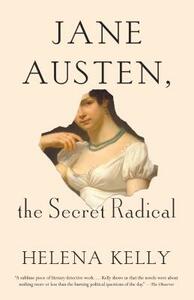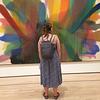Take a photo of a barcode or cover
challenging
informative
inspiring
slow-paced
I shelved this as 'to-read' when it was published in 2017; I bought it about a year and a half ago in preparation for my undergraduate dissertation on [b:Emma|6969|Emma|Jane Austen|https://i.gr-assets.com/images/S/compressed.photo.goodreads.com/books/1373627931l/6969._SY75_.jpg|3360164] but simply didn't have time to read the whole thing; now I've finally been able to read this fantastic book in its entirety!
This is not one of the many biographies of Jane which rely heavily on artistic license and conjectural readings of the scant number of her letters which remain in circulation. Instead Kelly conducts incredibly detailed close readings of each of Jane's published novels to reveal truly revolutionary undercurrents. Reading this book requires a certain suspension of disbelief; indeed a few of the conclusions she draws did seem slightly exaggerated to fit the narrative, even to me, who wrote a dissertation on the radical themes that can be gleaned from Austen. Furthermore her tone can get slightly pompous at times - it's not like she's the first person to conduct alternative readings of her texts. However on the whole this was a very convincing and thoroughly well researched appraisal of Jane's ideas through her novels. The chapter on [b:Mansfield Park|45032|Mansfield Park|Jane Austen|https://i.gr-assets.com/images/S/compressed.photo.goodreads.com/books/1397063295l/45032._SY75_.jpg|2722329] and its interlinked criticism of the Church of England and slavery was particularly illuminating and shocking. I can't wait to revisit all of Jane's books after reading this!
This is not one of the many biographies of Jane which rely heavily on artistic license and conjectural readings of the scant number of her letters which remain in circulation. Instead Kelly conducts incredibly detailed close readings of each of Jane's published novels to reveal truly revolutionary undercurrents. Reading this book requires a certain suspension of disbelief; indeed a few of the conclusions she draws did seem slightly exaggerated to fit the narrative, even to me, who wrote a dissertation on the radical themes that can be gleaned from Austen. Furthermore her tone can get slightly pompous at times - it's not like she's the first person to conduct alternative readings of her texts. However on the whole this was a very convincing and thoroughly well researched appraisal of Jane's ideas through her novels. The chapter on [b:Mansfield Park|45032|Mansfield Park|Jane Austen|https://i.gr-assets.com/images/S/compressed.photo.goodreads.com/books/1397063295l/45032._SY75_.jpg|2722329] and its interlinked criticism of the Church of England and slavery was particularly illuminating and shocking. I can't wait to revisit all of Jane's books after reading this!
challenging
informative
inspiring
medium-paced
This was a fascinating read, but a bit ironic that the author says, "we can't trust what we think we know of Jane Austen, because everything we know is other people's interpreting her, and not directly her," and then immediately following that up with, "What we do know about her is what she wrote, so let me now interpret that for you." Neither one of these points of view is subjective, though I admit I'm more inclined to believe that Jane Austen was a secret radical because I love her so much.
Despite that, and potentially dubious historical merit, quite interesting, well pieced together, well edited, and worthwhile.
Despite that, and potentially dubious historical merit, quite interesting, well pieced together, well edited, and worthwhile.
challenging
informative
reflective
slow-paced
August 2020:
This is the second time I’m reading this book and both readings have greatly enhanced my past and, I’m sure, future readings of Jane Austen’s work. I don’t agree with everything Helena Kelly asserts but I do appreciate the overall project of encouraging people to think and read Austen’s work more critically than they usually do, and to not read them as romance novels only. Because, honestly, would you actually want to be in one the main romantic relationships in Jane’s novels? I wouldn’t. (Not that we still can’t enjoy the romances in the films and various miniseries, of course, because I certainly plan to continue doing so.)
I think what I most appreciate about this book is the historical context it provides for the novels, as this completely changes my reading of them, most notably of Mansfield Park. Going into this reading, I couldn’t remember why Kelly ties MP so closely to abolitionist and anti-slavery ideas; it seems so absurd when you read it at face value to think it has these more radical undertones. When I reread that chapter, however, I was a little blown away. Knowing the historical context actually makes it very clear (to me, at least) that Jane is skewering the Church of England for its ties to slavery. It’s fascinating.
Overall, I appreciate the depth of knowledge Kelly has of Jane’s work. I always think I know these novels well but reading this book makes me realize how many little details I miss (along with the broader historical context, as mentioned above). I love gaining this whole other layer of knowledge for works that I feel I know so well.
I think the argument for Sense and Sensibility might be the strongest, although each chapter makes me read the novels in a new light.
I don’t love being told how to think, however, and as I wrote earlier I can’t bring myself to agree with every argument Kelly makes. Also, I think the fictional scenes that open each chapter could have been cut. That being said, (and this will not be surprising given I was an English major) I absolutely love this way of critically reviewing literature, especially when it comes to my favorite writer of all time.
This is the second time I’m reading this book and both readings have greatly enhanced my past and, I’m sure, future readings of Jane Austen’s work. I don’t agree with everything Helena Kelly asserts but I do appreciate the overall project of encouraging people to think and read Austen’s work more critically than they usually do, and to not read them as romance novels only. Because, honestly, would you actually want to be in one the main romantic relationships in Jane’s novels? I wouldn’t. (Not that we still can’t enjoy the romances in the films and various miniseries, of course, because I certainly plan to continue doing so.)
I think what I most appreciate about this book is the historical context it provides for the novels, as this completely changes my reading of them, most notably of Mansfield Park. Going into this reading, I couldn’t remember why Kelly ties MP so closely to abolitionist and anti-slavery ideas; it seems so absurd when you read it at face value to think it has these more radical undertones. When I reread that chapter, however, I was a little blown away. Knowing the historical context actually makes it very clear (to me, at least) that Jane is skewering the Church of England for its ties to slavery. It’s fascinating.
Overall, I appreciate the depth of knowledge Kelly has of Jane’s work. I always think I know these novels well but reading this book makes me realize how many little details I miss (along with the broader historical context, as mentioned above). I love gaining this whole other layer of knowledge for works that I feel I know so well.
I think the argument for Sense and Sensibility might be the strongest, although each chapter makes me read the novels in a new light.
I don’t love being told how to think, however, and as I wrote earlier I can’t bring myself to agree with every argument Kelly makes. Also, I think the fictional scenes that open each chapter could have been cut. That being said, (and this will not be surprising given I was an English major) I absolutely love this way of critically reviewing literature, especially when it comes to my favorite writer of all time.
Interesting subject matter, but I struggle with lit crit on a good day and the structure of this book was very difficult to engage.
This was an enjoyable, and interesting, read, but I couldn't escape the feeling that, quite a lot of the time, the author was rather stretching things to make her argument. She seems to begin most of her points with 'surely' Jane must have known this, or felt that, and therefore we can draw these conclusions from her text. And perhaps she's right, but she states her case with a lot more certainty than seems warranted.
Of course, the fact that she also expends a lot of energy in casting problematic aspersions on some (or most) of Jane Austen's beloved characters might be biasing me against her, as she no doubt anticipates. But even bearing that in mind, and trying to take it into account, I couldn't quite be convinced.
Even so, I think I'll reread the novels again.
Of course, the fact that she also expends a lot of energy in casting problematic aspersions on some (or most) of Jane Austen's beloved characters might be biasing me against her, as she no doubt anticipates. But even bearing that in mind, and trying to take it into account, I couldn't quite be convinced.
Even so, I think I'll reread the novels again.
I really enjoyed Kelly’s analysis of Austen’s works. I didn’t always agree with her, but she did a great job explaining some of the context that is lost to Austen’s modern readers. I liked that she used Austen’s letters at the beginning of each chapter, but I wasn’t a huge fan of her recreating scenes from Austen’s life based off of them. This is purely an audiobook version nitpick, but I also disliked that the narrator attempted a British accent when she read these letters. It was awful! On to the good things though. I believe the author is correct in her assertion that Austen’s works are taught entirely wrong. Modern readers see her as merely a romance author, when in fact she was actually slipping very daring social criticism between the romance. We do a disservice to Austen when we fail to pick up on her references to the political events and published works of her day.
I am a lifelong Austen fan, but I admit that I’ve always hated Mansfield Park. I always thought that Fanny Price was the dull heroine of the bunch. She’s very proper and events take place around her without much of her influence. This book achieved what I didn’t think was possible- it made me appreciate Mansfield Park. In fact, now I feel badly that the work that was clearly so dear to its author’s heart is so little loved by her fans. Once Kelly started putting the novel into context it was so easy to see what Austen was trying get across with Mansfield Park. Fanny isn’t meant to be lovable- she was meant to serve as England’s conscious. She was supposed to make Austen’s original readers reflect on where there money was coming from and face the horrors of slavery. It may not be her most lovable novel, but I think it was her most important. Austen used her novels as a way of critiquing the society she lived in. Women weren’t encouraged to have political opinions in her day. She definitely slipped hers into her writing if you know how to look for them. I really enjoyed this book and I have a feeling I will revisit it again.
I am a lifelong Austen fan, but I admit that I’ve always hated Mansfield Park. I always thought that Fanny Price was the dull heroine of the bunch. She’s very proper and events take place around her without much of her influence. This book achieved what I didn’t think was possible- it made me appreciate Mansfield Park. In fact, now I feel badly that the work that was clearly so dear to its author’s heart is so little loved by her fans. Once Kelly started putting the novel into context it was so easy to see what Austen was trying get across with Mansfield Park. Fanny isn’t meant to be lovable- she was meant to serve as England’s conscious. She was supposed to make Austen’s original readers reflect on where there money was coming from and face the horrors of slavery. It may not be her most lovable novel, but I think it was her most important. Austen used her novels as a way of critiquing the society she lived in. Women weren’t encouraged to have political opinions in her day. She definitely slipped hers into her writing if you know how to look for them. I really enjoyed this book and I have a feeling I will revisit it again.
informative
lighthearted
slow-paced






